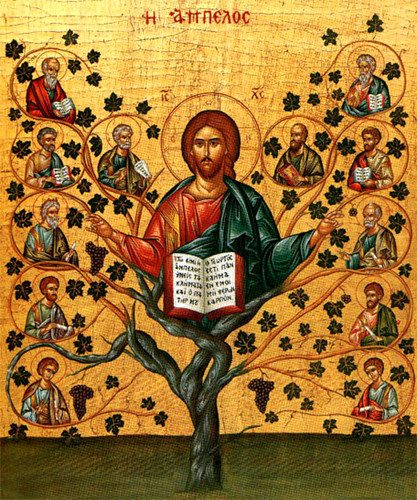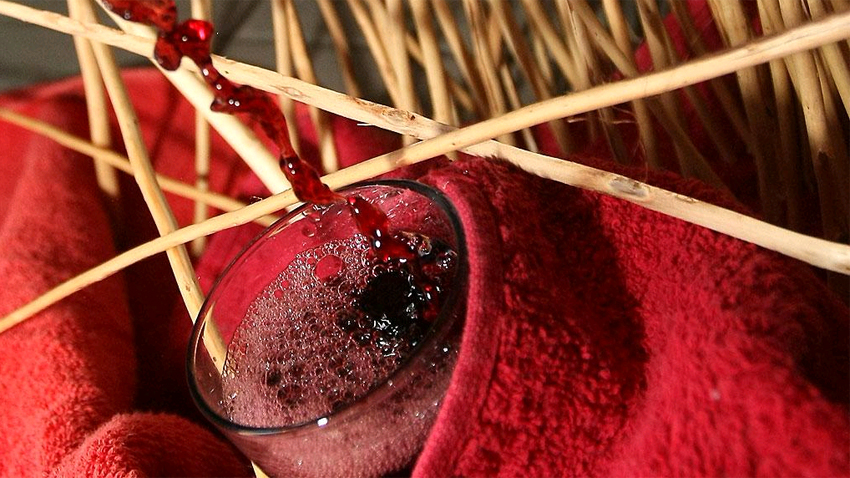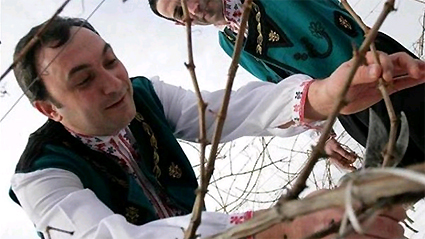Vines and wine have been inherent to our lands since time immemorial – from the times of the festivals in honour of the God of Wine Dionysus to the latter-day version of the folklore feast Trifon Zarezan. Dionysus himself is depicted with a vine twig around this forehead. In ancient Sumerian culture, vine-leaves were a symbol of life. Stamped on ancient coins they symbolize fertility and prosperity. In Bulgaria vine leaves are to be seen everywhere  you turn – in the traditional embroidery and needlework of the town women during the National Revival, in the decorations on ritual loaves. They are to be found in the woodcarvings on the iconostases in Bulgarian churches. The evangelical texts compare Jesus Christ to a grapevine and his disciples – to vine shoots. He is the “true vine” and his Father is the “vinegrower”. In Christianity the vine is the tree of life and knowledge; its fruit are the symbols of “hope of a happier afterlife.” According to legend, the vine was planted in Paradise by Satan and that makes for its duality – it was seen as heavenly and diabolical at the same time. After the Deluge the water carried off a vine twig from Heaven, Noah found and planted it. But because Noah was a holy man, God decided to change the way he regarded the vine. But people have always been a little apprehensive - vines have never shed their dual nature. They can do harm if you drink too much of one of their gifts – wine. Bulgarian proverbs describe wine in all sorts of ways – it is called “merrymaker at table” but also “head breaker”.
you turn – in the traditional embroidery and needlework of the town women during the National Revival, in the decorations on ritual loaves. They are to be found in the woodcarvings on the iconostases in Bulgarian churches. The evangelical texts compare Jesus Christ to a grapevine and his disciples – to vine shoots. He is the “true vine” and his Father is the “vinegrower”. In Christianity the vine is the tree of life and knowledge; its fruit are the symbols of “hope of a happier afterlife.” According to legend, the vine was planted in Paradise by Satan and that makes for its duality – it was seen as heavenly and diabolical at the same time. After the Deluge the water carried off a vine twig from Heaven, Noah found and planted it. But because Noah was a holy man, God decided to change the way he regarded the vine. But people have always been a little apprehensive - vines have never shed their dual nature. They can do harm if you drink too much of one of their gifts – wine. Bulgarian proverbs describe wine in all sorts of ways – it is called “merrymaker at table” but also “head breaker”.
In Bulgarian farming tradition there are a number of rules and rituals accompanying the planting and the tending to vineyards. It is believed that a new vineyard must be planted when there is a full moon – that will fill the casks with wine. However, this should not be done in a leap year because the vines will not bear fruit. Even though everything connected with vines and wine is considered a man’s job, the planting must be started off by a woman who has given birth to many and healthy children. With an incantation for fertility and abundance, she would pour white wine onto the ground three times in the shape of a cross. Only then could the men begin their work. On the day the vineyard was planted, beans had to be put on the table and while eating, the people of the house would utter their wishes – that the vine twigs and the grapes grow as heavy as bean pods. And of course, there had to be wine. The bread ritual, called “cask” was crucial to a good vintage. The bread would be made on Christmas eve from a smallish piece of dough made to resemble the wooden cask the wine was kept in. It was decorated with dough bars made to look like the hoops on the cask. The man of the house would symbolically fill the loaf with wine and take a drink. And all members of the household would then break off a piece of the bread, take a bite and then take it to the vineyard. Ritual “cask” loaves are also used in the rituals on Trifon Zarezan day, as well as when the vines are planted.

Grapes must never be thrown into the fire or somewhere dirty –they are used for communion. If a cluster of grapes or a twig finds its way in the fire, the grapes would dry out on the vine. The vine stick left over after the vineyard was cleared had to be burnt before Whitsuntide and if this was breached there would be less grapes. Many rainbows in the sky in summer were considered one of the good omens of fine wine in the autumn. In some parts of the country rainbows are popularly called “winewheat”. And if there was more red in the spring rainbow the wine would be good. The same prophecy gives vine twigs their red colour in autumn.
 In traditional beliefs, all gifts of the vine have the power to purify. According to traditional medicine some ailments will be cured if you drink grape juice and eat nothing for several days. Wine and bread cannot be used to cast spells because they are so pure. Even vinegar made from wine has the power to keep evil spells at bay. That is why children and young girls “given the evil eye” are washed with vinegar over a fire. Popular names in Bulgaria are Lozan, Lozanka, Lozinka, Grozdan, all derived from the Bulgarian words for vine and grapes. It is thought that their connection with them will give them eternal youth and prosperity.
In traditional beliefs, all gifts of the vine have the power to purify. According to traditional medicine some ailments will be cured if you drink grape juice and eat nothing for several days. Wine and bread cannot be used to cast spells because they are so pure. Even vinegar made from wine has the power to keep evil spells at bay. That is why children and young girls “given the evil eye” are washed with vinegar over a fire. Popular names in Bulgaria are Lozan, Lozanka, Lozinka, Grozdan, all derived from the Bulgarian words for vine and grapes. It is thought that their connection with them will give them eternal youth and prosperity.
English version: Milena Daynova
On February 2, according to the Bulgarian folk calendar, it is Petlyovden (Rooster Day) - a day dedicated to the health and fertility of male offspring. It is most widely popular in Eastern Bulgaria. One of the obligatory elements is the..
Wine will spout from two drinking fountains over the weekend in Delchevo. Perched on top of the mountain, the village located close to Gotse Delchev, has made a name for itself as a tourist attraction with its ancient architecture and the beautiful..
At the beginning of each year, The Bulgarian city of Razlog and the surrounding villages start feverish preparations for Babinden or Midwives’ Day. The holiday is dedicated to the “grannies” who helped women give birth. Every year it is celebrated on..

+359 2 9336 661
